
Strengths,Myths, and the Science Behind Quiet Minds
Strengths and superpowers of Introverts:
The fact that we are quiet does not mean that we are weak; it means we are focused.
Introverts are not given much credit in a world that favors those who are loud, have quick responses, and who network all the time. However, under the quiet facade, most of the introverts are concealing some strong characteristics that enable them to be amazing leaders, creators, problem solvers, and agents of change.
This chapter sheds light on what it is that introverts can and will contribute, unlike others, with the help of research, examples of life, and visual explanations.
1. Philosophers of Thought & Masterminds:
Analytical and futuristic are attributes of introverts. They do not act alone and reactively but pause, think, and strategize.
They are thoughtful and are usually the ones who think of coming to a decision from various angles before expressing themselves or taking an action.
They tend to be the people who, in a leadership or team role, ask the question: What have we not thought about yet?
An investigation performed by Grant et al. (2010) revealed that introverted leaders have a better chance of producing better results in proactive teams because they lend an ear to listen, think, and stimulate the input of others in the team as opposed to taking too much control.
Consider Abraham Lincoln, who is remembered as a non-vociferous thinker and meditative leader born in American history.
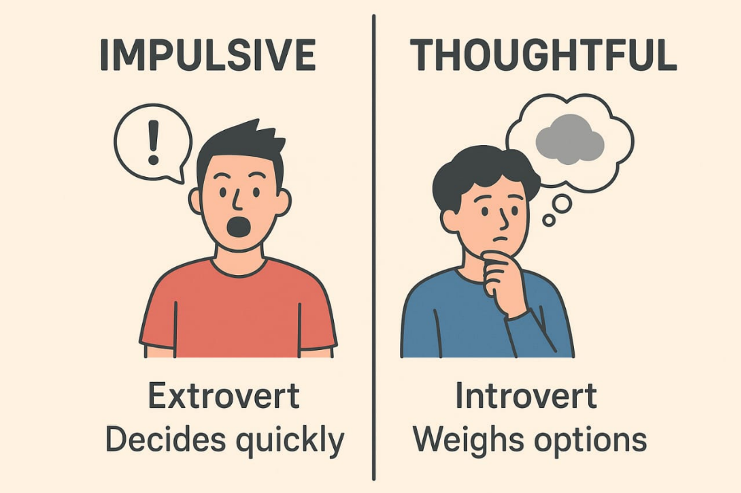
2. One of the most Creative and Original:
An introvert does not need solitude to feel lonely; solitude is to him a time of incubation.
Studies have revealed that individuals who are introverted are usually more creative compared to their counterparts (Long, 2014).
Introverts are normally gifted in areas where they must have high concentration and originality, like Music, writing, invention, design, and science.
Famous Introverts:
- J.K. Rowling (Author)
- Frida Kahlo (Artist)
- Bill Gates (Tech Innovator)
- Albert Einstein (Physicist)
Einstein once said, “The monotony and solitude of a quiet life stimulates the creative mind.”
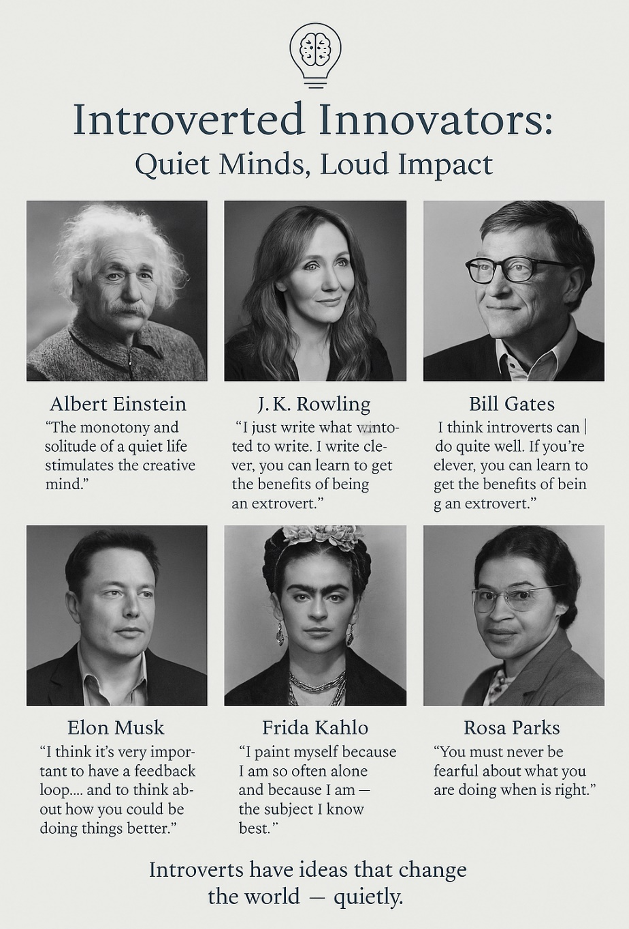
3. Great Listeners and Feeling Communicators:
True, introverts do not talk the most in meetings, but when they do, they can be attuned very much to what others are saying.
They have excellent tone, emotion, and subtext comprehension because they are wired to have long-range processing in the brain (Lieberman, 2007).
The chances are higher that they will not interrupt, they will pay attention to group dynamics, and they will offer listening responses.
Example: An introverted teacher or therapist may not be a take-charge person, but the students and clients will say they are very present, a very warm person, and attentive.
4. Cool under Fire:
Due to the nature of introverts to reflect on their emotions and internalize them privately, they are usually very calm and unflustered, even in some chaotic scenarios.
Their calm reaction makes them the best in addressing crisis, research, negotiation, and introvert leadership strengths, where an individual needs to have time.
Their research suggests that differentiated schools are becoming an increasingly prevalent way of educating students.
Research indicates that introverts have less impulsiveness and a higher level of inhibitory control and thus tend to think after responding (Beaty et al., 2016).
Example: An artistically inclined emergency-room nurse might not scream and panic, but he/she will think calmly, act rationally, and remain focused in the disorder.
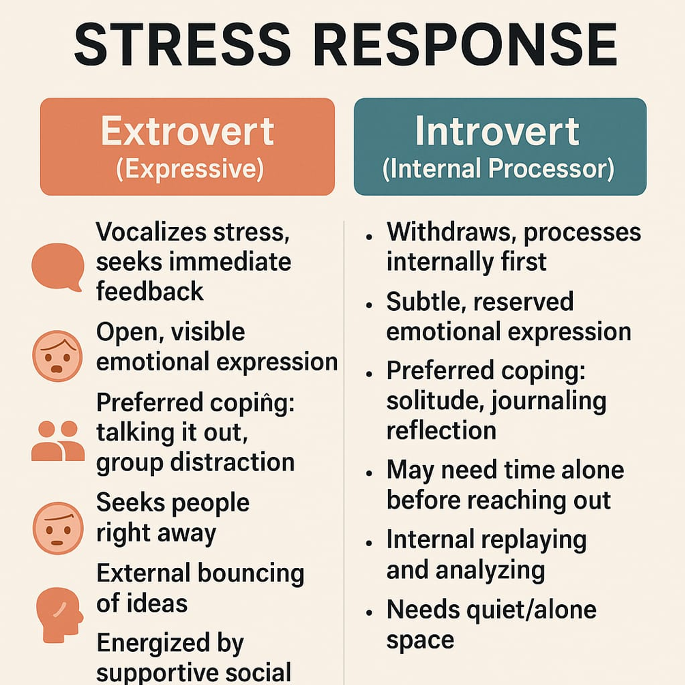
5. Self-motivated workers:
Introverts tend to do their work well in an independent setting where they are allowed to organize their time and space. They do not need as much external validation, and they are self-driven. This qualifies them to work as writers, coders, researchers, designers, engineers, and consultants.
Example: A software developer who is an introvert can spend hours on his or her own solving a problem alone, and come up with something brilliant without asking to be in the spotlight
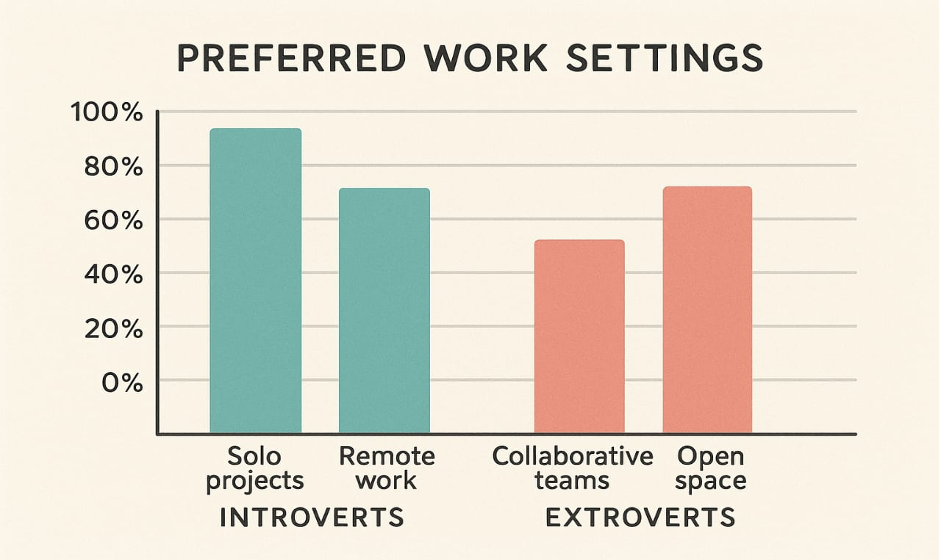
6. Making Quiet Leaders Have Lasting Impact:
Despite what we might think, introverts are amazing leaders, and it is not despite their quiet characteristics but because of them.
• They pay attention first, and then they talk
• It is better to empower teams, not to dominate them
• This means not making rash decisions
• Be a visionary and be humble
Grant, Gino, & Hofmann (2010) – Introverted leaders are better than extroverted leaders in teams that take initiative, as they do not hog the limelight.
The Famous Introvert Leaders:
- Barack Obama
- Rosa Parks
- Warren Buffett
- Marissa Mayer (ex-Yahoo! CEO)
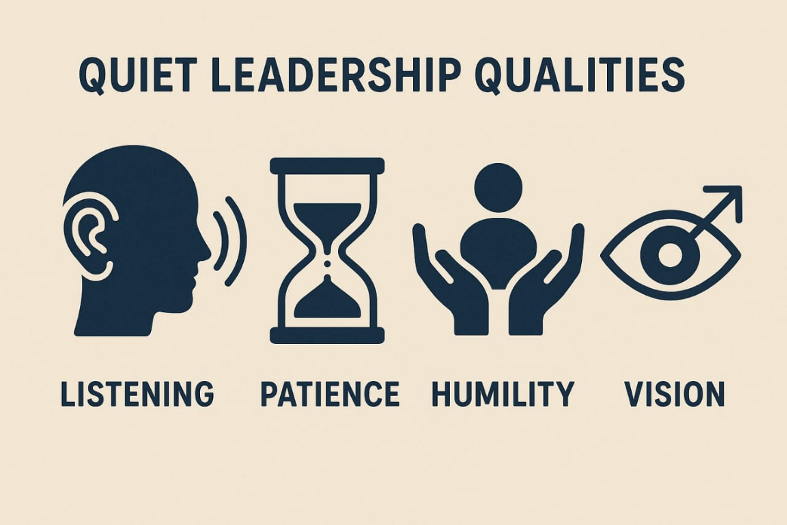
The Myths of Introverts:
Myth-Busting, One Quiet Fact at a Time
The introvert is an easy target to not only miss but badly misunderstand, in a world obsessed with such things as extroversion, the louder, faster, bolder approach to people and life. However, when it comes to most of these assumptions, they are downright erroneous and may result in faulty judgments at school, in the workplace, or even in love relationships.
We will bust some of the most popular myths about introverts and compare both worlds, as well as real-life examples and references, with the development of the psychological evidence. This section includes differences between introversion and shyness, and all the myths about introverts
MYTH 1: Introverts are Shy TRUTH: Introversion does not mean Shyness
- Shyness is the apprehension of social judgment or embarrassment.
- Introversion is the feeling of being in low-arousing situations. An introvert can love delivering a TED Talk, and still choose to lock himself/herself in his/her room on the weekend.
According to Cain (2012), shyness has its foundation in anxiety, whereas introversion relates much more to the way in which a person deals with stimulation and energy.
Example: The shy actress Emma Watson may have no problem when she has to act confidently on stage, but she may feel most comfortable when she sits behind the book and reads under the sun.
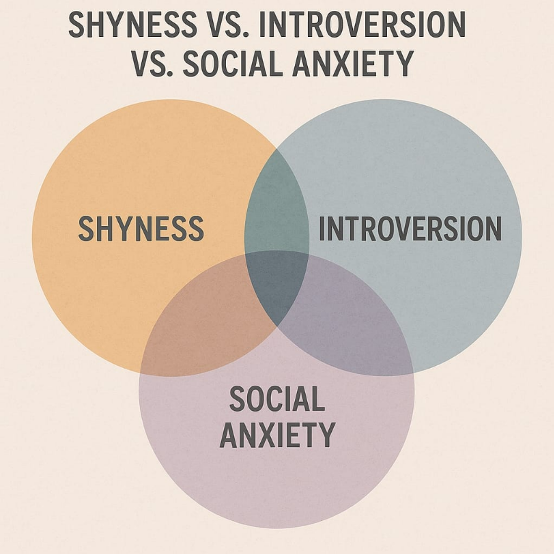
MYTH 2: Introverts do not like people TRUTH: They desire Connection – but in a different way:
- Notorious relationship people, introverts tend to gain value out of relationships but do not want superficial chat with a lot of people; there needs to be a few, meaningful ones.
- They are not antisocial; they are selectively social. They might require time alone to restore themselves, yet this does not imply that they do not adore people as well.
Introverts say they are closer and loyal to their friends (Asendorpf, 1990). Example: An introvert may not be the one to attend the afterparty, but the next to give his or her friend a nice message on texting them.
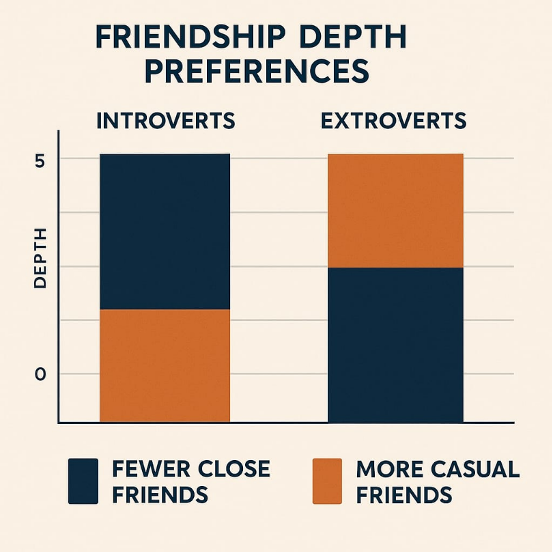
MYTH 3: Introverts are Bad Leaders TRUTH: Silent Leadership Is Agile
- Humility, listening, and long-term vision are the virtues of introverts who tend to lead.
- Indeed, there is a tendency among introverted leaders and succeed in a team or task-oriented workplace.
According to Grant et al. (2010), introverted leaders are more likely to listen to the input of a team, and this results in a better outcome.
Example: Barack Obama, being soft-spoken and reflective, is a strong illustration of introverted leadership.
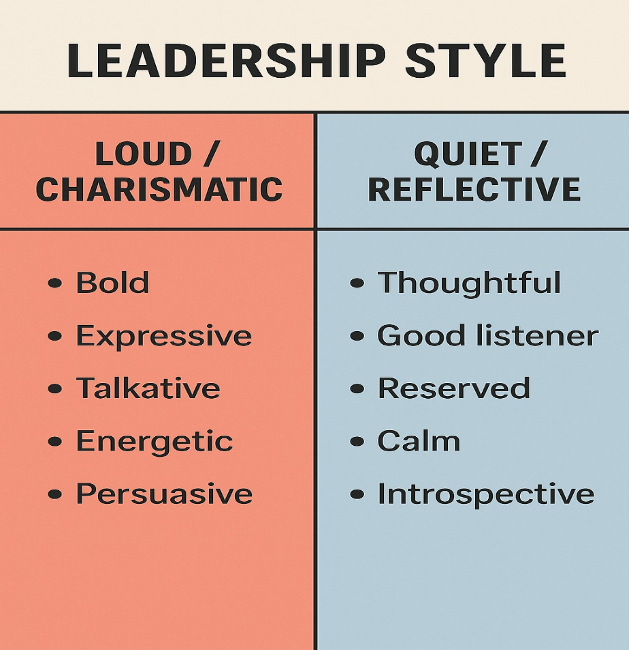
MYTH 4: Introverts are awkward in gatherings. Truth: They Just Speak in Different Languages
Introverts could take longer to respond; however, what they say is usually more well-considered, considered, and accurate. They may not be interested in small talk, but they take a whole interest in what can be thought of as deep, intellectual, or meaningful conversations.
Introverts are more active in the frontal lobes, which are connected with profound thought and thinking that is interior (Laney, 2002).
Example: At a party, an introvert can stay silent, and then spend 2 hours talking to someone about the nature of astrophysics, art, or trauma recovery.
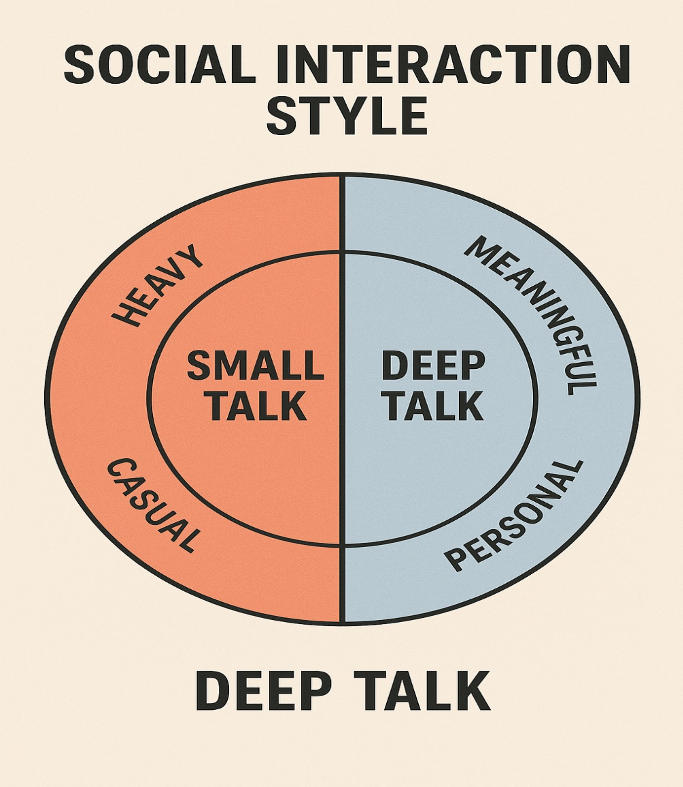
MYTH 5: An Introvert Cannot Be Happy on His/Her Own TRUTH: Solitude Has Nothing to Do with Loneliness
Solitude is something many introverts find really enjoyable – a shelter where they rest, create works, and think over. Although human beings are social beings, introverts prefer to do their activities alone (reading, writing, walking, meditating), which are emotionally rewarding and enhancing.
- Loneliness is the issue of disconnection.
- Solitude is the self-relatedness.
According to psychologist Carl Jung, loneliness was a part of becoming an individual and the only way people could grow.
Artists, programmers, thinkers, and they all tend to be introverts work best in silence.
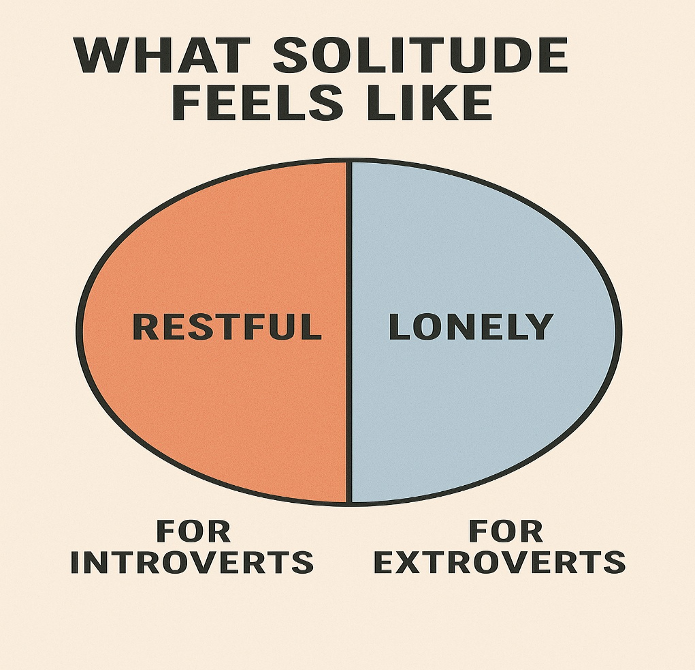
What is the significance of breaking these myths?
These tags on them may lead to:
• lower their confidence
• get fewer chances to be selected for opportunities
• put their mentors and parents into confusion
• Underestimate different styles of talking to one another
But when understood, we can admire the whole range of personality, which extends, on the one hand, to the extrovert who loves to be on the stage, and the cave-dweller, the creator.
The Science of Solitude: How Introverts Recharge:
The Reasons Why Alone Time Is Not Only Good but Good Enough
To an introvert, they need time alone, not as a luxury, but because it is quite biological. Whereas extroverts get energy by engaging others, introverts find energy by looking inside, by going into their silent worlds where they can wander, rejuvenate, and read. So, what is the science behind this necessity, how it appears in everyday life, and why loneliness is not to be confused with solitude? What is solitude vs loneliness for introverts?
1. Chemistry of the Brain and Energy Transfer:
- That is because introverts and extroverts literally process stimulation differently; it begins with the brain. The dopamine system of introverts is more sensitive.
- They get overstimulated by heavy crowds, chatters, etc. They instead use more of acetylcholine, which is a neurotransmitter associated with serene concentration, retention, and introspection.
According to Dr. Marti Olsen Laney (2002), introverts respond better to the activation of the parasympathetic nervous system, i.e., one needs rest, reflection, and calm in order to be in a state of balance.
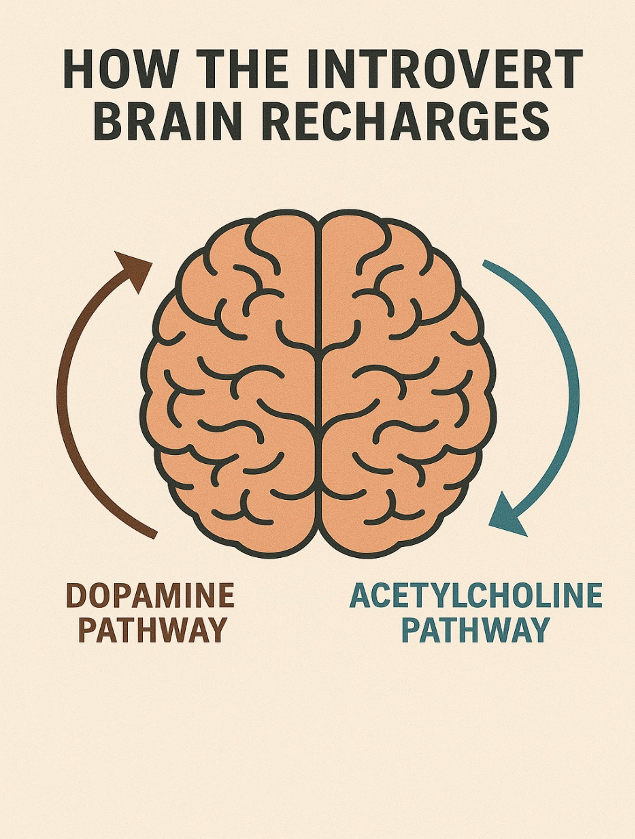
2. The Indicators That an Introvert Requires a Recharge:
Contrary to the extroverts who can be pumped up after a party, the introverts may require recovery, even in events that they like.
It is common to have:
- Mentally tired
- Hyperstimulation instead of simple stimulation
- Physical fatigue or people are full
- Strong need to have time alone
- Got separated even from their loved ones.
Example: There may be an introvert who is deeply in love to go to the wedding, but the following day he or she lies in bed reading, with the feeling of totally avoiding social life.
3. What recharging means for an introvert:
Solitude is not sitting in a dark room, not saying anything (though this is helpful). Introverts renew themselves in all sorts of ways, their own way. Sometimes it is deliberate, self-paced, and low-stimuli.
Introvert recharge activities list is here.
- Writing in the diary or reading a book were really long nature walks
- listening to music or a podcast on their own
- Different hobbies like gardening, etc.
- Exercises (yoga, running, cycling)
- Hearing a movie with earphones on
A study conducted by Long and Averill (2003) has led to the discovery that solitude helps in building self-restoration, enhanced creativity, and further emotional clarity, especially in people who are introverted.
Example: In the real world, this argument can be demonstrated with the following example: An introvert can spend the following morning in silence, drinking a cup of tea after hosting a dinner party, because he or she likes the balance.
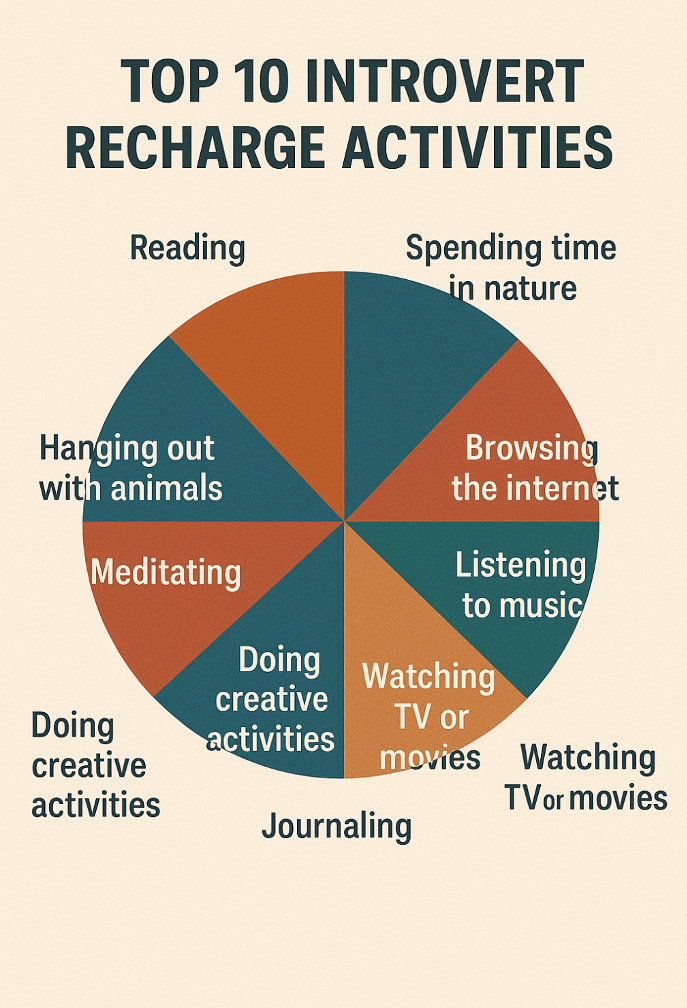
Power of solitude as a source of emotional power:
Being alone is beneficial to introverts:
- Think through emotions and nothing external
- Find their values, thoughts, and identity again
- Slow in processing and less anxious
- Control of their nervous system
Susan Cain, in her book Quiet, states:
Solitude matters. It is the air to some individuals.
Asceticism is important because solitude helps in the process of individuation, a major step in discovering oneself and a personal wholeness founded on ancient wisdom, a critical aspect pointed out by Carl Jung.
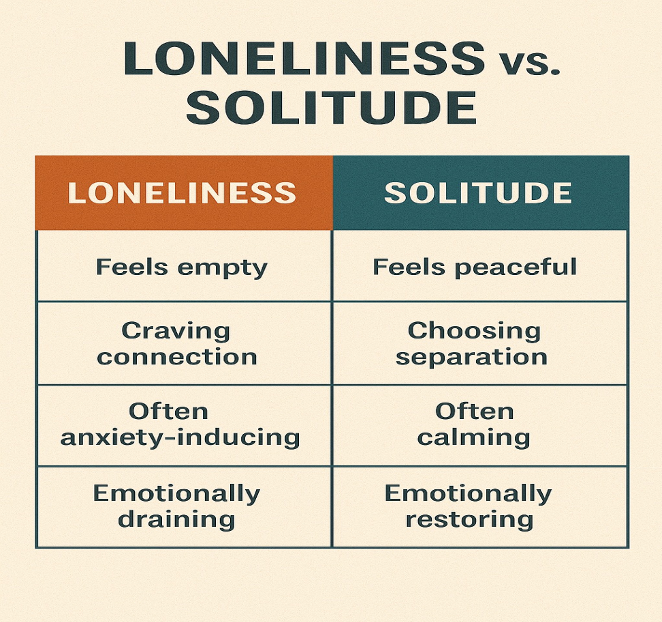
5. What Is the Benefit of Solitude?
Isolation or rumination can creep in when you spend more time alone, and this happens mostly when avoidance or anxiety motivates it.
Aloneness is good:
- It is worthwhile, and it heals
- Makes you less stressed, more lucid, or focused
- It would not substitute a good connection – it makes it balanced
The healthy kind of solitude stimulates the default mode network within the brain, the system specialized in daydreaming, introspecting, and memory consolidation (Raichle et al., 2001).
Aloneness is bad:
When alone, it could be burning up or turn lonely, it could be depressed and anxious, or have aches of unfulfilled social desires.
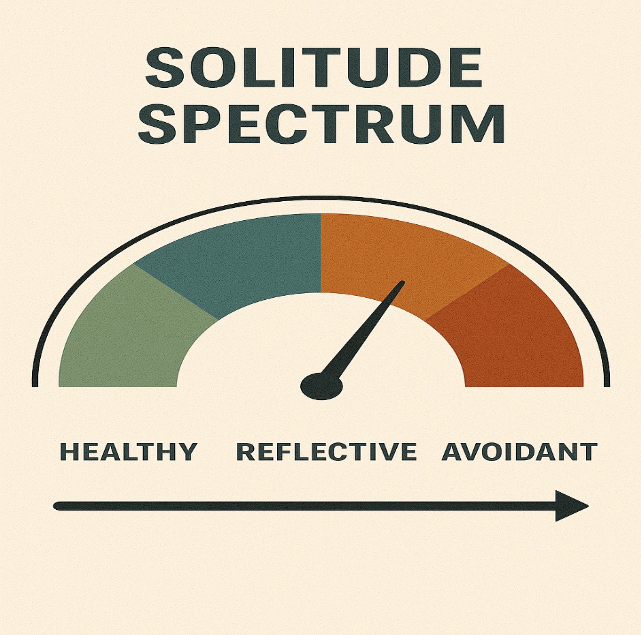
Important note: The Recharging phase
It is not that introverts only like their alone time; they need it to recharge themselves cognitively and emotionally. The depth of stimulation is deeper in their nervous system, which causes faster depletion of energy. Recharging enables them to become more present, inventive, and linked when they get back into the social world.
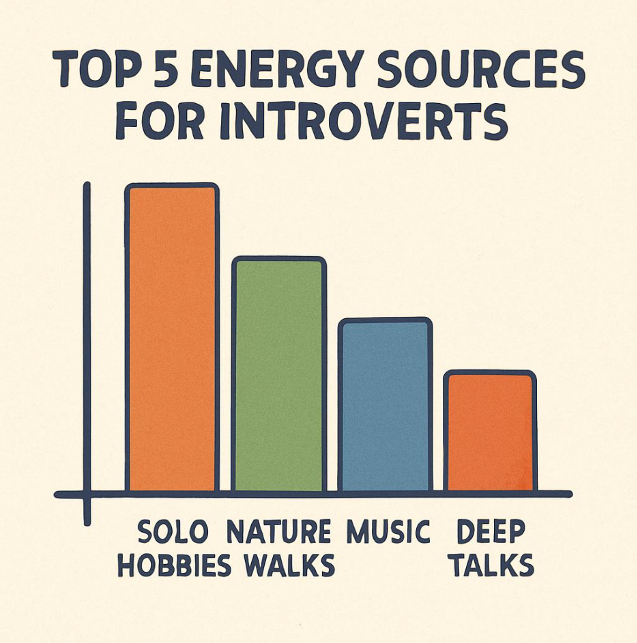
Relationships & Social Life as an Introvert:
How Silent personalities can socialize, fall in Love, and whether they connect with introverted people are not bad at relationships or emotionally unavailable as some people assume.
More often than not, they tend to be the most supportive, considerate, loving partners and friends. They have different values when it comes to relationships, namely, more focus on depth than breadth, more listening than performing, and authenticity over popularity.
Social and romantic relationships bring a lot of challenges to an introvert, but I have it covered, so you can read the science, real-life experiences, and practical knowledge of how to be an introvert in social and romantic relationships.
1. The way Introverts build relationships:
Introverts do not tend to be social butterflies, and when they bond, there is seriousness and there is durability.
- Selective- They do not bond with everybody, and when they do, it is purposeful.
- Slow Burners: Hook-ups are not formed on the fly.
- Quality matters the most: 2 good friends > 20 coasting.
- Good listeners: they pay full attention and listen to you.
Introverts are more likely to take intimate revelations, active listening to one another, and into a mutual trust, which makes them more satisfied in the relationship (Fehr, 1996).
Example: An introvert will not send you several messages an hour. When he does send you a text, that person will know your dog by name, your favourite book, and how you take your coffee.
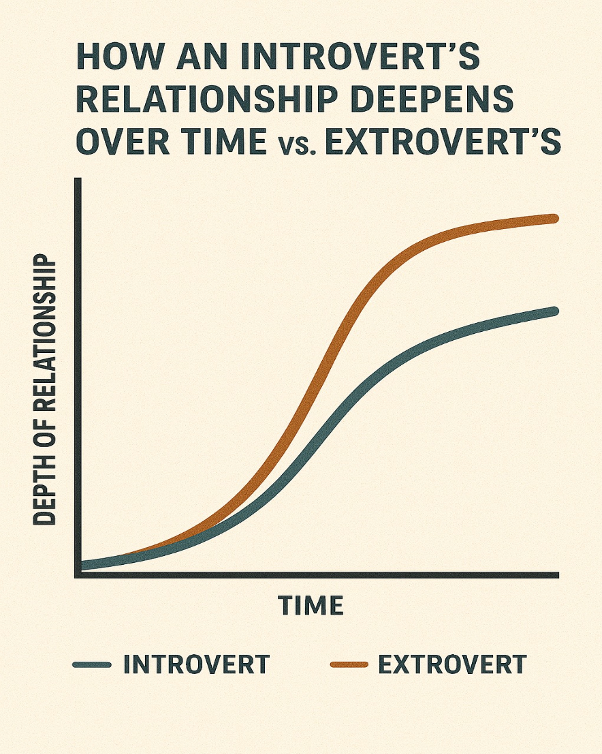
2. Style of Friendship: Loyal and Low Maintenance:
- Being an introvert, you can have friends who feel like long silences, which are not awkward long discussions of 3 hrs or more about life, dreams, and fears. Late-night memes, vanishing without a trace, and causing no drama. Urgent Note
- The 4 best girls in the world have gone online! They would not be checking in frequently, but they are very much concerned. They require friends who do not interpret silence as being disconnected.
Science-proven Fact: Introverts have higher chances of scoring strongly against emotional depth, sincerity, and long-term loyalty (Cheek & Buss, 1981).
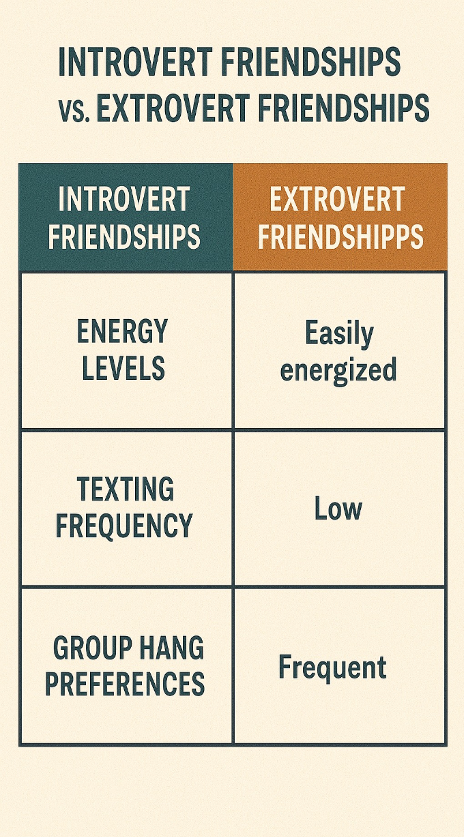
3. They make calm, smooth, and meaningful romantic relationships:
Introverts are very often committed, reflective, and rather emotionally smart partners, although they might need a longer time to open up. Characteristics of closed lovers:
- Exclusive love (small acts > big showy ones)
- Considerate communication (cards, too-long texts, playlists)
- Extreme loyalty (displays some trust of late taken a long time they earn, but they do remain)
Want to Science of Independence by Closeness. Would rather work together in calm and quiet activities (Netflix over clubbing)
Intrapersonal intelligence is more concentrated among introverts and helps them control their emotions and figure other people out (Gardner’s Theory of Multiple Intelligences).
Example: Rather than an extravagant party celebrating Valentine’s, an introvert will want to cook a nice homemade dinner, prepare a personalized playlist, and write a list.
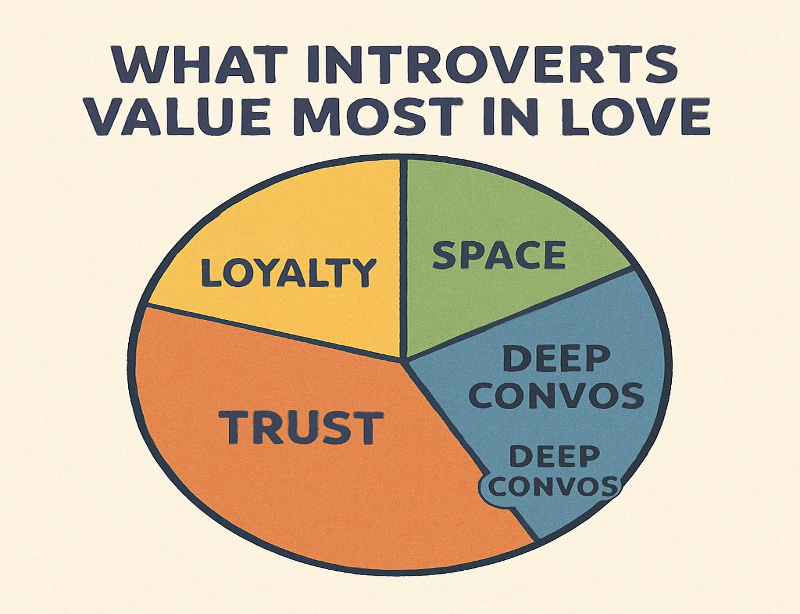
4. Relationship Social Burnout:
In a social or romantic dynamic where one is forced to talk all the time, introverts will burn out more quickly than their extrovert counterparts.
Introvert burnout signs are;
• Exhausted and moody after being called/texted too much
• The necessity of having some time after a date or a meeting
• Being grumpy without space
Introverts feel fit in a relationship where their need for solitude is not derided but instead, accepted.
Note: It is not distance. It is emotional healing. Introverts also tend to love and be present to partners who value this.
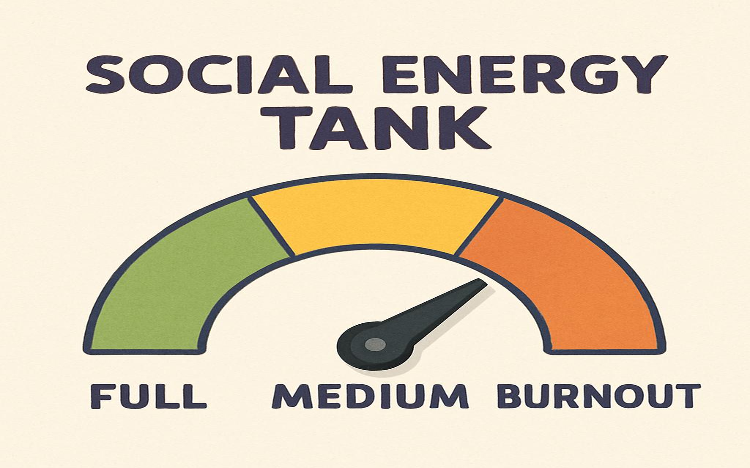
Frequently asked questions:
Q1: Can Introverts Turn to Extroverts After Some Time?
In a nutshell: No, not really, but ways can change.
Your essential temperament (introvert vs. extrovert) is mostly genetically guided and formed during the early development of the brain (Jung, 1921; Eysenck, 1967).
Nevertheless, introverts can train themselves to be more extroverted, when necessary, in the workplace, in relationships, or the survival.
Fun Fact: The word conscientious is not in the dictionary anymore. This skill is referred to as pseudo-extroversion, that is, behaving more extroverted at a given time, and it can be tiresome when perpetuated (Wilt & Revelle, 2009).
Q2: Why Introverts Require Alone Time and the Amount of Alone Time?
Introverts are internal processors of the world, i.e., they screen and then ponder on the experiences. The time alone not only allows the brain to rest but also makes sense of what they are exposed to.
They have increased activity in the default mode network (DMN) – this is the part of the brain that does the introspection and imagination (Raichle et al., 2001)
Q3: Do Introvert Feel Less Happy Than Extroverts?
By no means. Researchers have found that being an introvert does not make someone any less happy, just that they get their pleasure elsewhere.
It is the way people live, rather than their personality type, that is more critical in their levels of happiness (Hills & Argyle, 2001).
Q4: Are Introverts able to have Relationships with Extroverts?
Of course, one can think of numerous extrovert-introvert couples who are successful. However, it demands an understanding of the energy needs between each other.
- Be considerate of each other in terms of recharging
- Discipline yourself to have time alone and with others
- Be able to speak about overstimulation
Fun fact: An Introvert must remain at home and read. Out he goes, an Extrovert, brings home reports. It is win-win for everyone.”
Q5: What Can I Do to Figure Out Whether I Am an Introvert or Burned Out?
Burnout leads to fatigue and withdrawal, whereas introversion is an energy-boosting situation.
It is Signs of Introversion (not burnout):
- You come out better after a period of solitude •
- You have a good time being alone, and you do not fear being alone
- It is not fatigue that you experience in the crowds, but rather overstimulated. Signs that it could be Burnout:
- Exhaustion (with or without) sleep
- The depressing of motivation or pleasure in all things
Q7. Does being an introvert make a good parent, leader, or entrepreneur?
Absolutely. Introverts are more likely to bring thoughtfulness, patience, and emotional intelligence to their positions.
The Study of Leadership:
Introvert leaders are usually more successful than extroverts when dealing with proactive workgroups (Grant et al., 2011). These Roles Have Introvert Superpowers:
Parents: concerned and emotionally available
Entrepreneurs: those who are self-motivated, creative, and focused
Well-known Introverts– Warren Buffett, Elon Musk, Rosa Parks, Albert Einstein, JK Rowling
Q8. How can I support my introvert child or partner and make them shine?
- Do not take it personally, leave them space.
- Do not insist on them to keep socializing
- Cheer, what strong waters they are
- Gives, not takes, gives priorities in social situations
Tip: Do not punish introversion by talking about it as a problem. Normalize that it is totally okay and you are normal. Rather, spin it into an exclusive and strong character.
Conclusion:
Introverted people, commercially too, aren’t merely existing; they are lining up a future without making a sound about it.
Introverts can also be inadequately served in a world that thinks that people who are louder than others must be leaders, the speedier ones must be more successful, and the more visible ones must have value.
However, the reality is that introverts are not anyone whose extroversion is malfunctioning; rather, they are critical voices that are needed regarding the human experience. They are the back-of-the-room revolution leaders, philosophize silently, hear a lot, and provide a grounding source by being in the storm.
Science has proved that introverts introduce depth with velocity, authenticity with performance, and resilience with noise.
It may be the meticulous thinking of Albert Einstein, the stoic perseverance of Rosa Parks, or the dreamy concentration of Elon Musk, but history teaches us one thing: the world owes much of its gains to some silent minds. Note: Being an introvert is no shortcoming; it is a brain type. It is the way you get energized, reflect, and relate to others, not being reserved and isolative or fearful.
Introverts are people who feel good when they admire their rhythms, establish boundaries, and find meaning in purposeful experiences.
It is when society has the correct balance of extrovert power and introvert wisdom that it is successful.
Final Thought: Being an introvert in an extroverted world does not define a flaw itself but is a stealth-mode superpower. The better you know it, the more you will be able to appreciate its genius -not in your own person, but in others also.
And introversion is not a curse that needs to be cured. Find something you enjoy doing—not because it is what you think you should be doing with your free time.” Susan Cain, the author of Quiet, says:
What’s Next? In case this guide was useful to you, take into consideration:
- Being able to share it with your friends who may sympathise with you
- Writing about the introvert nature in you
Reading more books/ listening to more podcasts/ looking at graphics, allowing yourself to have the space to live your life low-key, deep, and rich.
References:
- Fehr, B. (1996). Friendship Processes
- Gardner, H. (1983). Frames of Mind: The Theory of Multiple Intelligences
- Laney, M. O. (2002). The Introvert Advantage
- Cain, S. (2012). Quiet: The Power of Introverts in a World That Can’t Stop Talking
- Long, C. R., & Averill, J. R. (2003). Solitude: An Exploration of Benefits of Being Alone
- Raichle, M. E., et al. (2001). A default mode of brain function
- Grant, A. M., Gino, F., & Hofmann, D. A. (2010). Reversing the Extraverted Leadership Advantage: The Role of Employee Proactivity.
- Lieberman, M. D. (2007). Social Cognitive Neuroscience.
- Beaty, R. E., Benedek, M., Silvia, P. J. (2016). Creativity and the default network: A functional connectivity analysis of the creative brain at rest.
- Long, C. R., et al. (2014). Solitude as a catalyst for creativity.
- Laney, M. O. (2002). The Introvert Advantage
- Cain, S. (2012). Quiet: The Power of Introverts in a World That Can’t Stop Talking
- Henderson, L., Zimbardo, P. (2014). Shyness: Evolutionary Tactic or Learned Response?
- Grant, A. et al. (2011). Introverted Leadership Styles
- Yuan, Y., Zhu, Y., et al. (2012). Resting-state connectivity and personality traits
WHAT IS AN INTROVERT- THE SCIENCE BEHIND THE SILENCE >
Dr. Mehwish Zeeshan
Dr. Mehwish Zeeshan, a passionate Veterinary Doctor and author at The Word Flick, blending science with stories to inspire and inform.
